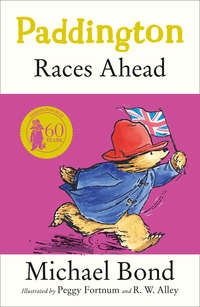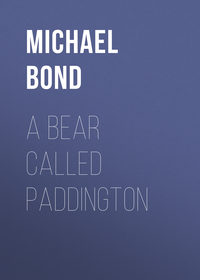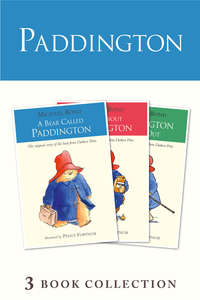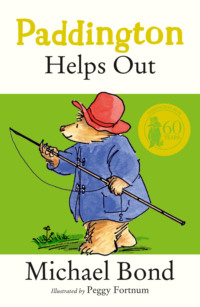
Полная версия
Paddington Complete Novels
“Fancy turning right at a piece of dried marmalade peel,” grumbled Mr Brown. “That policeman didn’t like it at all.”
Anxious to make amends, Paddington stuck his head out of the window and sniffed.
“I think we must be getting near, Mr Brown,” he called. “I can smell something unusual.”
“That’s the gas works,” said Mr Brown, following the direction of Paddington’s paw. “The river’s on this side.”
Just as he spoke they swept round a corner and there, straight in front of them, was a broad expanse of water.
Paddington’s eyes lit up as they all clambered out of the car and while the others were unloading the supplies he stood on the water’s edge and surveyed the scene. He was most impressed.
The towpath was crowded with people and there were boats everywhere. Rowing boats, canoes, punts and sailing boats with their white sails billowing in the wind. As he watched, a steamer packed with more people swept by, sending a large wave shooting across the water and causing all the smaller boats to rock. Everyone on board seemed very cheerful and happy and several of them pointed towards Paddington and waved.
Paddington raised his hat in reply and then turned to the others. “I think I’m going to like the river,” he announced.
“I do hope so, dear,” said Mrs Brown uneasily. “It is your treat.”
She looked at the row of boats moored by the landing stage. The day before it had seemed a very good idea of Mr Brown’s to have a picnic on the river. But now they were actually here she had a nasty feeling in the back of her mind and she knew Mrs Bird was feeling the same way. Close to, the boats looked awfully small.
“Are you sure they’re safe, Henry?” she asked, looking at them nervously.
“Safe?” echoed Mr Brown, as he led the way on to the landing stage. “Of course they’re safe, Mary. You just leave everything to me.
“I’ll put you in charge of all the ropes and things, Paddington,” he called. “That means you can steer.”
“Thank you very much, Mr Brown,” said Paddington, feeling most important. His eyes gleamed with excitement as he climbed into the boat and carefully examined everything with his paws.
“The boatman’s rather busy,” said Mr Brown, as he helped the others in. “So I said we would shove off by ourselves.”
“Paddington!” exclaimed Mrs Brown, as she picked Mrs Bird’s best sun hat off the floor of the boat. “Do mind what you’re doing with that fishing net. You’ll have someone’s head off.”
“I’m sorry, Mrs Bird,” said Paddington. “I was only testing it.”
“All right,” said Mr Brown, as he settled himself on his seat and took a firm grip on the oars. “Here we go. Stand by at the helm, Paddington.”
“Do what, Mr Brown?” cried Paddington.
“Pull on the ropes,” shouted Mr Brown. “Come on – left paw down.”
“Oh dear,” said Mrs Bird nervously, as she clutched the side of the boat with one hand and gripped her sunshade with the other. Out of the corner of her eye she could already see a number of people staring in their direction.
In the back of the boat Paddington pulled hard on the two ropes tied to the rudder. He wasn’t quite sure whether Mr Brown had meant his, Mr Brown’s, left, or his own left, so he pulled both just to make certain. Everyone waited expectantly while Mr Brown strained on the oars.
“I should have thought, Henry,” said Mrs Brown, after a few moments had gone by, “it would have been much easier if you’d untied the boat from the landing stage first.”
“What!” exclaimed Mr Brown. He mopped his brow and looked crossly over his shoulder. “Hasn’t anyone done that yet?”
“I’ll do it, Mr Brown,” called Paddington importantly, as he clambered along the side of the boat. “I’m in charge of ropes.”
The Browns waited patiently while Paddington examined the rope. He wasn’t very good at knots because they were rather difficult with paws, but eventually he announced that all was ready.
“Right!” shouted Mr Brown, as he braced himself once more. “Here we go. Cast off, Paddington. Hold on, everyone!”
“Do what, Mr Brown?” cried Paddington, above the splashing of the water. Having a picnic on the river was much more complicated than he had expected. There were so many ropes to pull he was getting a bit confused. First of all Mr Brown told him to untie the rope. Now he had shouted to everyone to hold on.
Paddington closed his eyes and held on to the rope with both paws as tightly as he could.
He wasn’t quite sure what happened next. One moment he was standing on the boat -the next moment it wasn’t there any more.
“Henry!” shouted Mrs Brown, as there was a loud splash. “For goodness’ sake! Paddington’s fallen in the water!”
“Bear overboard!” cried Jonathan, as the boat shot away from the bank.
“Hold on, Paddington!” called Judy. We’re coming.
“But I did hold on,” cried Paddington, as he came up spluttering for air. “That’s how I fell in.”
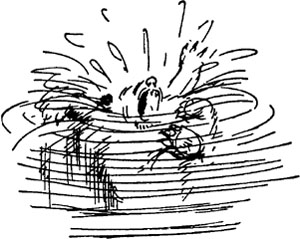
Mrs Brown lunged into the water with her sunshade. “Do hurry, Henry,” she cried.
“I’m sure Paddington can’t swim,” said Judy.
“What did you say?” called Paddington.
“She said ‘you can’t swim’,” yelled Mr Brown.
When he heard what Mr Brown said Paddington began waving his paws wildly in the air and there was a gurgle as he promptly sank.
“There now, Henry,” exclaimed Mrs Brown. “Now look what you’ve done. He was all right until you spoke.”
“I like that!” said Mr Brown, giving his wife an expressive look.
“It’s all right,” shouted Jonathan. “Someone’s thrown him a lifebelt!”
By the time the Browns reached the landing stage Paddington had already been rescued and he was lying on his back surrounded by a large crowd. Everyone was staring down at him making suggestions while the man in charge of the boats pulled his paws back and forth, giving him artificial respiration.

“Thank goodness he’s safe,” exclaimed Mrs Brown thankfully.
“Don’t see why ’e shouldn’t be,” said the man. “If ’e’d layed ’isself down it’d only ’ve come up to ’is whiskers. The water’s only about nine inches deep just ’ere. Probably a lot less now – judging by the amount ’e’s swallowed. Kept ’is mouth open when ’e went under, I dare say.”
Judy bent down and looked at Paddington. “I think he’s trying to say something,” she said.
“Grrr,” said Paddington as he sat up.
“Now just you lay still for a moment, young feller-me-bear,” said the boatman, pushing Paddington back down again.
“Grrr,” said Paddington. “ITHINKI’VELOSTMYHAT.”
“ITHINKI’VELOSTMYHAT,” repeated the man, looking at Paddington with renewed interest. “Are you one of them foreign bears? We get a rare lot of overseas visitors at this time of year,” he said, turning to the Browns.
“I come from Peru,” spluttered Paddington, as he got his breath back. “But I live at number thirty-two Windsor Gardens in London, and I think I’ve lost my hat.”
“Oh dear,” said Mrs Brown, clutching her husband’s arm. “Did you hear that, Henry? Paddington’s lost his hat!”
The Brown family stared at each other in dismay. They often grumbled about Paddington’s hat – usually when he wasn’t listening – because it was so old. People had a habit of pointing at it when they were out and it made them feel embarrassed. But all the same, they couldn’t even begin to picture Paddington without it.
“I had it on when I fell in the water,” cried Paddington, feeling on top of his head. “And now it isn’t there any more.”
“Gosh,” said Jonathan. “It had so many holes in it too! Perhaps it’s sunk.”
“Sunk!” cried Paddington in dismay. He ran to the edge of the landing stage and peered at the muddy water. “But it can’t have sunk!”
“He’s always worn it,” explained Mrs Brown to the boatman. “Ever since we’ve known him. It was given to him by his uncle in Peru.”
“Darkest Peru,” said Paddington.
“Darkest Peru,” repeated the boatman, looking most impressed. He turned to Paddington and touched his forelock. “You’ll be wanting the Thames Conservancy, sir.”
“No, I don’t,” said Paddington firmly. “I want my hat.”
“He means they look after the river, dear,” explained Mrs Brown. “They may have found it for you.”
“It’s the current, sir,” explained the boatman. “Once you get away from the bank it’s very strong and it may have got swep’ over the weir.” He pointed along the river towards a row of buildings in the distance.
“Got swep’ over the weir?” repeated Paddington slowly.
The boatman nodded. “If it ain’t already been sucked into a whirlpool.”
Paddington gave the man a hard stare. “My hat!” he exclaimed, hardly able to believe his ears. “Got sucked into a whirlpool?”

“Come along,” said Mr Brown hastily. “If we hurry we may be just in time to see it go over.”
Closely followed by Mr and Mrs Brown, Mrs Bird, Jonathan and Judy, the boatman and a crowd of interested sightseers, Paddington hurried along the towpath with a grim expression on his face, leaving a trail of water behind him.
By the time they reached the weir the news had already spread and several men in peaked caps were peering anxiously into the water.
“I hear you’ve lost a very valuable Persian cat,” said the lock-keeper to Mr Brown.
“Not a cat,” said Mr Brown. “A hat. And it’s from Peru.”
“It belongs to this young bear gentleman, Fred,” explained the boatman as he joined them. “It’s a family heirloom.”
“A family heirloom?” repeated the lock-keeper, scratching his head as he looked at Paddington. “I’ve never heard of a hat being a family heirloom before. Especially a bear’s heirloom.”
“Mine is,” said Paddington firmly. “It’s a very rare sort of hat and it’s got a marmalade sandwich inside. I put it in there in case of an emergency.”
“A marmalade sandwich?” said the lock-keeper, looking more and more surprised. “Wait a minute – it wouldn’t be that thing we fished out just now would it? All sort of shapeless… like a… like a…” He tried hard to think of words to describe it.
“That sounds like it,” said Mrs Bird.
“Herbert!” called the man to a boy who was standing nearby watching the proceedings with an open mouth. “See if we’ve still got that wassname in the shed.
“It might well be an heirloom,” he continued, turning to the Browns. “It looks as if it’s been handed down a lot.”
Everyone waited anxiously while Herbert disappeared into a small hut by the side of the lock. He returned after a few moments carrying a bucket.
“We put it in here,” said the lock-keeper apologetically, “because we’d never seen anything like it before. We were going to send it to the museum.”
Paddington peered into the bucket. “That’s not a wassname,” he exclaimed thankfully. “That’s my hat.”
Everyone breathed a sigh of relief. “Thank goodness,” said Mrs Bird, echoing all their thoughts.
“There’s a fish inside it as well,” said the lock-keeper.
“What!” exclaimed Paddington. “A fish? Inside my hat?”
“That’s right,” said the man. “It must have been after your marmalade sandwich. Probably got in through one of the holes.”
“Crikey,” exclaimed Jonathan admiringly, as the Browns gathered round the bucket. “So there is!”
“That means Paddington’s won the prize for catching the first fish,” said Judy. “Congratulations!”
“Well, if it’s some kind of competition,” said the lock-keeper, “I’d better get you a jam-jar to put it in, sir.
“I suppose,” he said, looking rather doubtfully at the hat, “you’ll be wanting to wear it again?”
As Paddington gave him a hard stare he backed away and hurried off in search of a jam-jar. “There you are,” he said when he returned. “With the compliments of the Thames Conservancy.”
“Thank you very much,” said Paddington gratefully, offering the man his paw.
“Not at all,” said the man, as he stood on the side of the lock to wave them goodbye. “It’s a pleasure. After all, it’s not every day we have the opportunity of saving a bear’s heirloom from going over the weir. I shall remember today for a long time to come.”
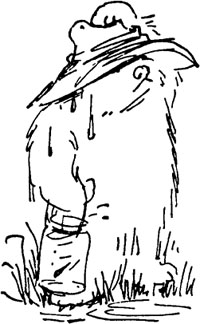
“And so shall I remember it,” said Mr Brown as he stopped rowing somewhile later and let the boat drift lazily downstream in the current. “It may not have been the quietest day we’ve ever spent on the river, but it’s certainly the nicest.”
And the Brown family, as they lay back in the boat watching the shimmering water and listening to the music from the gramophone, had to agree.
Paddington, as he held on tightly to his hat with one paw while he dipped the other into a jar of his favourite marmalade, agreed most of all. Now that he had got his hat back and everything had been restored to normal he felt it was quite the nicest day he’d had for a long time.
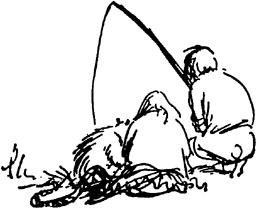
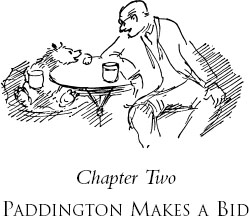
Paddington’s friend, Mr Gruber, laughed no end when he heard all about the trip on the river.
“Oh dear, Mr Brown,” he said, wiping the tears from his eyes, “things do happen to you. I wish I could have been there to see it all.”
It was the morning after the picnic and Paddington had hurried round as soon as possible to tell Mr Gruber about it.
Mr Gruber kept an antique shop in the Portobello Road. It was near the Browns’ house and Paddington usually called in when he was doing the morning shopping so that they could share a bun and a cup of cocoa for their ‘elevenses’. In his younger days Mr Gruber had been to South America and so they were able to have long chats together about Darkest Peru while sitting in their deck-chairs on the pavement. Paddington always looked forward to seeing Mr Gruber and he often lent a paw around the shop.
Most of the shops in the Portobello Road were interesting, but Mr Gruber’s was the best of all. It was like going into Aladdin’s cave. There were swords and old suits of armour hanging on the walls, gleaming copper and brass pots and pans stacked on the floor, pictures, china ornaments, pieces of furniture and pottery piled up to the ceiling; in fact, there was very little one way and another that Mr Gruber didn’t sell, and people came from far and wide to seek his advice.
Mr Gruber also kept a huge library of second-hand books in the back of his shop which he let Paddington consult whenever any problems cropped up. Paddington found this most useful as the Public Library didn’t have a bear’s department and the assistants usually looked at him suspiciously when he peered through the window at them.
After Paddington had explained to Mr Gruber all about his trip on the river they fell silent for a moment while they ate their buns and drank their cocoa.
It was while he was sitting back in his deck-chair admiring the view and watching the passers-by that Paddington noticed Mr Gruber’s shop window for the first time that morning. To his surprise it looked unusually empty.
“Ah,” said Mr Gruber, following his glance. “I had a very busy day yesterday, Mr Brown. While you were having high jinks on the river a big party of American visitors came round and they bought all kinds of things.
“As a matter of fact,” he continued, “I did so well I have to go to an auction sale this afternoon to pick up some more antiques.”
“An auction sale?” said Paddington, looking most interested, “What does it look like, Mr Gruber?”
Mr Gruber thought for a moment. “Well,” he began, “it’s a place where they sell things to the highest bidder, Mr Brown. All kinds of things. But it’s very difficult to explain without actually showing you.”
Mr Gruber rubbed his glasses and coughed. “Er… I suppose, Mr Brown, it wouldn’t be possible for you to come along with me this afternoon, would it? Then you could see for yourself.”
“Oooh, yes, please, Mr Gruber,” exclaimed Paddington, his eyes gleaming with excitement at the thought. “I should like that very much indeed.”
Although they met most days, Mr Gruber was usually busy in his shop and they seldom had the opportunity of actually going out together.
At that moment a customer entered the shop and so, having arranged to meet Mr Gruber after lunch, Paddington raised his hat and hurried back home to tell the others.
“Hmm,” said Mrs Bird, when she heard all about it over lunch. “I pity the poor auctioneer who tries to sell anything when Paddington’s there. That bear’ll knock anyone down to half-price.”
“Oh, I’m not buying anything, Mrs Bird,” said Paddington, as he reached out a paw for a second helping of treacle tart. “I’m only going to watch.”
All the same, when he left the house after lunch, Mrs Bird noticed he was carrying his old leather suitcase in which he kept all his money.
“It’s all right, Mrs Bird,” said Paddington, as he waved goodbye with his paw. “It’s only in case of an emergency.”
“Just so long as he doesn’t come home with a suite of furniture,” said Mrs Bird as she closed the door. “If he does it’ll have to go in the garden.”
Paddington felt very excited as he entered the auction rooms. Mr Gruber had put on his best suit for the occasion and a number of people turned to stare at them as they came through the door.
Having bought two catalogues, Mr Gruber pushed his way to the front so that Paddington would have a good view. On the way he introduced him to several of the other dealers as “Mr Brown – a young bear friend of mine from Darkest Peru who’s interested in antiques.”
They all shook Paddington’s paw and whispered that they were very pleased to meet him.
It was all much different to what Paddington had expected. It was really like a very big antique shop, with boxes and tables loaded with china and silver round the walls. There was a large crowd of people standing in the middle of the room facing a man on a platform who appeared to be waving a hammer in the air.
“That’s the auctioneer,” whispered Mr Gruber. “He’s the man you want to watch. He’s most important.”
Paddington raised his hat politely to the auctioneer and then settled down on his suitcase and carefully looked around.
After a moment he decided he liked auction sales. Everyone seemed so friendly. In fact, he had hardly made himself comfortable before a man on the other side of the room waved his hand in their direction. Paddington stood up, raised his hat and waved a friendly paw back.

No sooner had he sat down than the man waved again. Being a polite bear, Paddington stood up and once more waved his paw.
To his surprise the man stopped waving almost immediately and glared at him instead. Paddington gave him a hard stare and then settled down to watch the man on the platform who appeared to be doing something with his hammer again.
“Going…” the man shouted, hitting the table. “Going… gone! Sold to the young bear gentleman in the hat for three pounds fifty!”
“Oh dear,” said Mr Gruber, looking most upset. “I’m afraid you’ve just bought a set of carpentry tools, Mr Brown.”
“What!” repeated Paddington, nearly falling off his suitcase with surprise. “I’ve bought a set of carpentry tools?”
“Come along,” said the auctioneer sternly. “You’re holding up the proceedings. Pay at the desk, please.”
“A set of carpentry tools,” exclaimed Paddington, jumping up and waving his paws in the air. “But I didn’t even say anything!”
Mr Gruber looked most embarrassed. “I’m afraid it’s all my fault, Mr Brown,” he said. “I should have explained auction sales to you before we came in. I think perhaps I’d better pay for them as it wasn’t really your fault.
“You see,” he continued, when he returned from the desk, “you have to be very careful at a sale, Mr Brown.”
Mr Gruber went on to explain how the auctioneer offered each item for sale, and how, after one person had made a bid for something, it was up to anyone else who wanted it to make a better offer.
“If you nod your head, Mr Brown,” he said, “or even scratch your nose, they think it’s a sign you want to buy something. I expect the auctioneer saw you raise your hat just now and thought you were bidding.”
Paddington wasn’t at all sure what Mr Gruber meant, but having carefully made sure the auctioneer wasn’t looking, he quickly nodded and then sat very still while he watched the proceedings.
Although he didn’t say anything to Mr Gruber, he was beginning to wish he hadn’t come to the auction. The room was hot and crowded and he wanted to take his hat off. Apart from that he was sitting on the handle of his suitcase, which was most uncomfortable.
He closed his eyes and was just about to try and go to sleep when Mr Gruber nudged his paw and pointed to the catalogue.
“I say, Mr Brown,” he said. “The next item is very interesting. It’s an old pistol – the sort highwaymen used. They’re quite popular just now. I think I shall try bidding for it.”
Paddington sat up and watched excitedly as the auctioneer held the pistol in the air for everyone to see. “Lot thirty-four,” he shouted. “What am I bid for this genuine antique pistol?”
“Twenty pounds,” came a voice from the back of the room.
“Twenty pounds fifty,” called Mr Gruber, waving his catalogue.
“Twenty-two pounds,” came another voice.
“Oh dear,” said Mr Gruber, making some calculations on the side of his catalogue. “Twenty-two pounds fifty pence.”
“Twenty-three pounds,” came the same voice again.
Paddington stood on his case and stared across the room. “That’s the man who made me buy the carpentry tools by mistake,” he whispered, tapping Mr Gruber excitedly.
“Well, we mustn’t let him have it whatever we do,” exclaimed Mr Gruber. “Twenty-three pounds fifty!”
“Twenty-four pounds,” cried Paddington wildly.
“Ahem,” said Mr Gruber tactfully, not wishing to offend Paddington. “I think we’re bidding against each other, Mr Brown.”
“Any advance on twenty-four pounds?” shouted the auctioneer, looking most pleased.
As there was no reply he raised his hammer. “Going… going…” he called. “Gone!” He brought the hammer down with a loud crash. “Sold to the young bear gentleman in the front row for twenty-four pounds.”
Mr Gruber felt in his wallet for the money. Taking Paddington to an auction sale was becoming rather expensive.
“I’m sorry about that, Mr Gruber,” said Paddington guiltily, when he returned. “I’m afraid I got rather excited.”
“That’s all right,” said Mr Gruber. “It was still a very good bargain, Mr Brown – and I did want it. I shall put it in my window tomorrow.”
“I think perhaps I’d better not do any more bidding,” said Paddington, looking very crestfallen. “I don’t think bears are very good at it.”
“Nonsense,” said Mr Gruber. “You’ve been doing very well for a first time.”
All the same, Paddington decided to keep quiet for a while and watch Mr Gruber. It was all very complicated and not a bit like shopping in the market, where he was allowed to test everything with his paws first before arguing over the price.
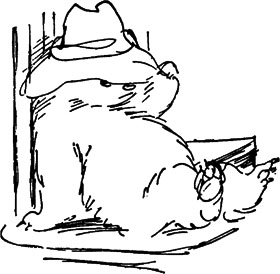
Mr Gruber pointed out several items in the catalogue to Paddington and gave him a pencil so that he could mark off the ones he had bought and how much had been paid for them.


